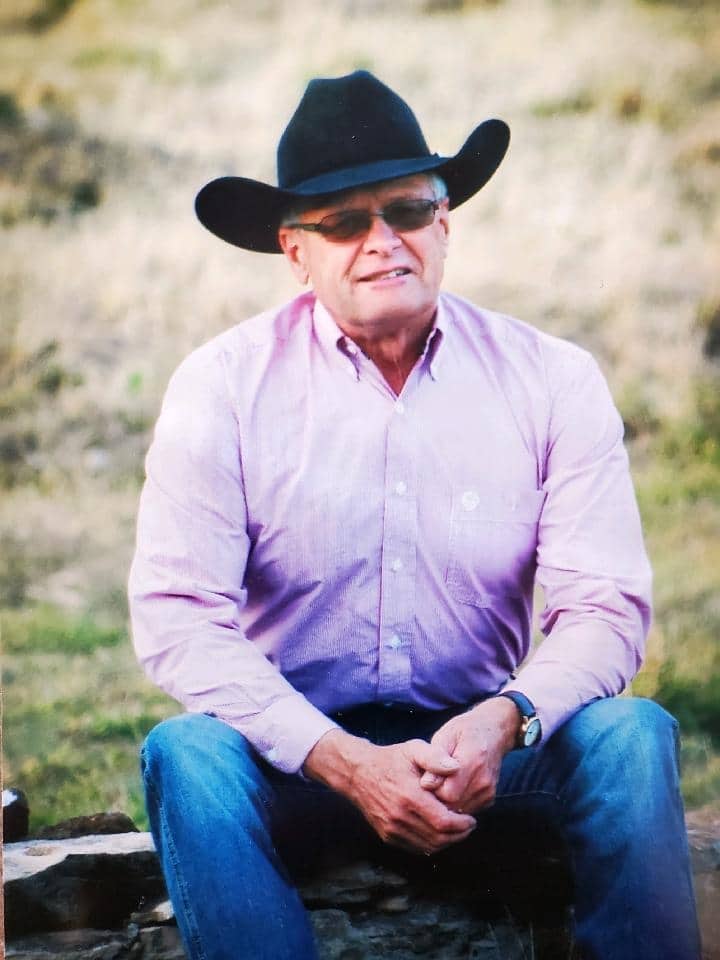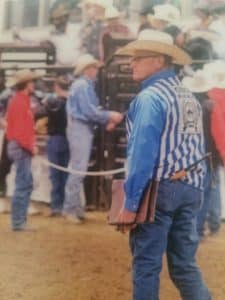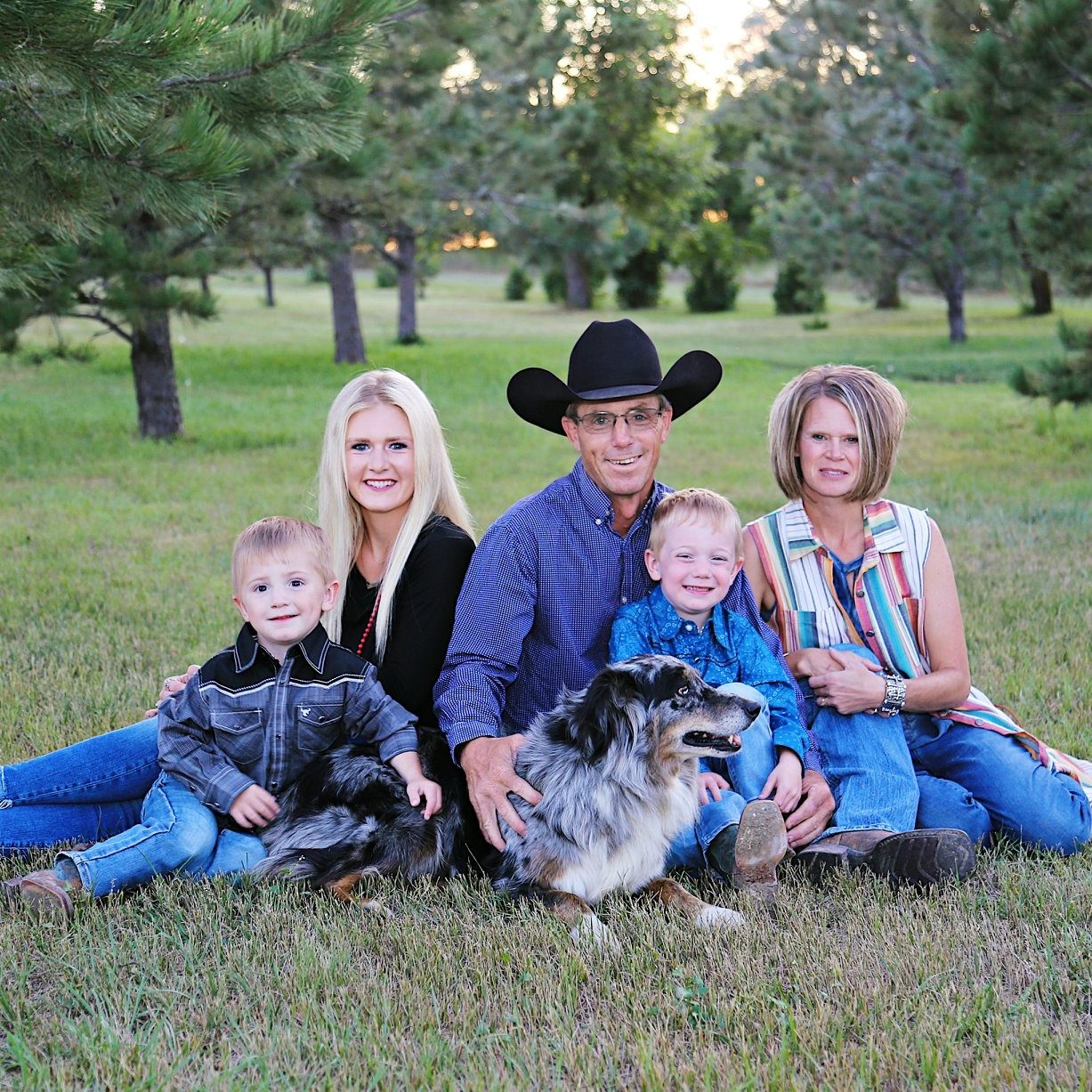ADS

Chuck Christman [Photo: submitted]
The governor of the rodeo arena, known as the rodeo judge, has a mind encrypted with the rule book, a photo finish eyesight, and a fierce focus. Their split-second decisions are backed with experience and knowledge providing confidence with a backbone to make the hard calls.
Once the decision is made, there is no replay to reconsider; it’s on to the next competitor, dedicating a clear mind for a full surveillance. On the dirt, friendship ties dissipate, history is forgotten, the slate is wiped clean allowing a fair and honest shake to each competitor.
The integrity the judge brings to the arena supersedes him, rallying the respect of the competitors. Seeing the name of Chuck Christman, of Lemmon, South Dakota, listed as a judge brings assurance to the athletes there will be a fair and level playing field for all.
Ride along with Christman as he takes us through his journey as a judge and concludes with priceless advice to the future judging recruits.
What spurred your interest to step into the arena to fill the shoes as an official rodeo judge?
“About 30 years ago, I got my feet wet by flagging team ropings and judging open and junior rodeos on occasion. At the time I was still competing in the arena, so judging was here and there as time allowed. Around 20 years ago, after the kids were grown and gone, I hung up my competition spurs, which left a void and time on my hands to be filled. My love for rodeo and the people involved did not stray far from my heart, tugging at me to step back into the rodeo scene. I had encouragement from fellow judges and contestants to fill the role as a judge, so here I am 20 years later enjoying every minute of it.”
When you’re involved in rodeo, no matter what capacity, it means you must put the time into preparing to be your best. How do you arm yourself to provide the rodeo competitors with a fair shake?
“The only way to arm yourself is to know and understand the rules of every event. Attend clinics hosted by various associations; put your knowledge into practice; and above all, treat all contestants the same no matter if a veteran champion or a rookie.”
Defined skills develop with experience and are sculpted by a mentor who aids in building confidence and shared knowledge. Who played an important role in advancing your skills as a judge?
“Back when I was still competing, I attended a judging clinic hosted by NFR qualifier and judge, Duane Howard, from Minnewauken, North Dakota. His extensive knowledge laid the groundwork for me, which I still rely on today.”
“As my career progressed, long-time PRCA judge and friend, Mike Steiger, from Mobridge, South Dakota, has been my go-to guy for rule interpretations and questions on different scenarios presented in the arena. Steiger has judged rodeos across the country for different associations, providing a layer of expertise I have used extensively in the last 20 years. In addition, I have had the privilege to judge with NFR qualifiers and judges, Wade Berry and Marty Jandreau. Their in-depth knowledge and willingness to help, along with Steiger has played a major role in advancing my judging career.”

Chuck Christman [Photo: submitted]
Your welcomed presence in the arena as a judge has enhanced the rodeo venues for decades. As a (rodeo) veteran, your “WHY” has amplified over the years. Please take us to the campfire and share the story of the passion that drives you to step into the arena as a judge.
“I have been involved in rodeo my whole life, from riding calves at playdays, to competing in 4-H, high school, college, and amateur rodeos. My love for the sport was cultivated at a young age, growing deep roots that has kept me involved with rodeo to this day.”
“Of course, when you are young, you don’t realize that competition years are few, especially in the riding events. When my competition days ended, I had a wife, three children, and a newly purchased ranch that needed my undivided attention. For about 20 years, I found myself on the outside of the arena fence, hauling kids to different events, serving on local rodeo committees, barely finding time to enter a team roping.”
“When the kids left the nest, the fast pace halted, leaving a void that needed to be filled. That is when I dug up all my old notes, studied rule books, attended clinics, and purchased memberships to be eligible to judge. The fire was ignited!”
“I purchased memberships to judge the NDRA, SDRA, NRCA, and RRA. I judged high school and junior high rodeos, later moving into NIRA and PRCA shows. The first year of “hanging out my shingle”, I judged six rodeos in the NDRA and SDRA. The second year increased to 13 rodeos, and since then I have judged up to 24 rodeos in a season. I have been fortunate enough to be selected to add the following judging titles to my resume: 12X NDRA Finals, 6X NRCA Finals, 4X SDRA Finals, 6X NDHSRA Finals, 4X SDHSRA, along with NDJHRD Finals and SD 4-H Finals a couple of times.”
“In the last couple of years, I have decided to slow down judging and spend more time with family and in the arena as a team roper. Lately, I have been judging in the NDRA and PRCA, with a couple of college rodeos added in. I will gravitate to judging rodeos closer to home along with a few bronc or bull ridings. I plan to remain active as a judging director on the NDRA board for a couple more years before retiring completely.”
A new generation of judges are showing up in the arena in hopes of earning the respect of the competitors and the veteran mentors. What advice could you offer a rookie judge to carry with him, as he blazes his own trail as a rodeo judge?
“Through experience, engrained knowledge, and collaboration with other judges, the unwritten advice is endless. The following are just a few important pieces to keep in mind. If you are interested in being a judge, first off you must know the job doesn’t start when the rodeo starts, or ends when it ends. You have to be there no matter what in all kinds of weather conditions. You must have the ability to handle all kinds of situations with grace, not only during the events but prior to and after the rodeo.”
Knowledge is power. Attend every and all the clinics possible to gain extensive knowledge. There are many associations that host clinics every year that are free or relatively inexpensive.
Shadow an experienced judge at a rodeo. Most local associations allow shadowing, providing an opportunity to be involved, having a front row seat to the judging as the rodeo progresses.
Ask questions! Don’t be afraid to ask experienced judges questions, a call you observed them make, a call you noticed on tv or a rule you don’t understand. There is no such thing as a stupid question in the rodeo world!
Don’t be afraid to put yourself “OUT” there. As an official, not every call is going to be easy and not everyone is going to agree with the call. Know your rules, be professional in answering questions and don’t be afraid to say you were wrong! You must establish a subtle influence, show integrity, and use intelligent rule enforcement (precise knowledge of the rules).
Prior Competitor. Having competed in rodeo brings inherited knowledge to the position, providing an understanding of what to look for in a ride or a run. This is not required but very useful when getting started.
Horsemanship Skills. To provide a better view for a fair call, there is riding involved as a judge. Sometimes the horses designated for the judge are a little interesting to say the least.
Exhibit hustle. Remember you are working for a committee whose main goal is to entertain a paying crowd in a suitable timeframe.
Be decisive. Contestants will try a judges’ decisiveness on a call. If you show any sign of not knowing the rule or call you will make, you are in for a long day or a long career. You must have courage, poise, and rapport with the contestants. In addition, you should dress appropriately and professionally, portraying confidence and respect.
NEVER look at a video to make or change a call! With all the technology out there, someone is taping every run or every ride and if the contestant disagrees with the call, they will try to get you to look at the video to change your call.
Finally… remember that the judges utmost concern is the protection of the contestant. The contestant has invested to be there through time, money, and dedication. Judges know that correct rulings can motivate improvement through the trial-and-error learning process, keeping the fire lit in the contestant to compete.
Last of all, enjoy what you are doing! Make the experience pleasant for all involved. A good judge should be transparent. By doing his/her job correctly, nobody should even know you are in the arena!

